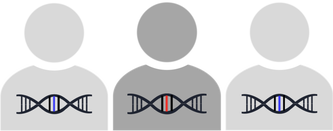An essential subset of our genetic material lives inside the mitochondria, which is an organelle central to cellular function. Mitochondrial genome variation is linked to a range of phenotypes, including rare and common diseases. Despite its importance in health and disease, the functional and clinical impact of most mitochondrial variants remains unknown. Furthermore, the toolkit for analyzing mitochondrial variants lags behind that available for the nuclear genome. We want to help change this.
Our research mission is to help realize the promise of genomic medicine for all by promoting a holistic approach to human genetics that includes both mitochondrial and nuclear genomes. To do this, we will use computational and experimental methods to advance our understanding of which mitochondrial genomes impact health and disease, and the circumstances in which they have functional and phenotypic consequences. This work is important to enable accurate prediction of disease risk from our entire genome.
The Lake Lab will initially focus on the following research arms to better understand how our genomes underlie health and disease:
Our research mission is to help realize the promise of genomic medicine for all by promoting a holistic approach to human genetics that includes both mitochondrial and nuclear genomes. To do this, we will use computational and experimental methods to advance our understanding of which mitochondrial genomes impact health and disease, and the circumstances in which they have functional and phenotypic consequences. This work is important to enable accurate prediction of disease risk from our entire genome.
The Lake Lab will initially focus on the following research arms to better understand how our genomes underlie health and disease:
Characterizing genetic variation
|
Improving variant classification
|
Discovering causes of disease
|
Collectively, these research arms aim to advance our understanding of how genetic variation impacts health and disease, across the human population




